Earlier this year, the world's best selling bourbon launched a new liqueur which mixes its four year old bourbon, used in their famous White Label, with honey. The result was Jim Beam Honey. We were invited to the UK launch, which saw a London square turned into a large beehive with bartenders serving cocktails while wearing beekeeping outfits. Jim Beam Honey has captured the attention of non-whisky drinkers and seems to go from strength to strength with its recent launch in the European travel retail sector.
Showing posts with label whisky liqueurs. Show all posts
Showing posts with label whisky liqueurs. Show all posts
Wednesday, November 7, 2012
Wednesday, July 18, 2012
Have just tried - Drambuie 15 years old
At Whisky For Everyone we do not often dip in to the world of whisky liqueurs. As with many consumers, we enjoy the occasional sip around Christmas time but that's about it. We recently had the opportunity to try a new(ish) product from one of the leading brands in the category. Whisky liqueurs seem to have a poor reputation and are regarded as being sugary and super sweet. However, despite the category shrinking dramatically in recent years there are still some lovely examples on offer.
One such example is the Drambuie 15 years old - the aforementioned new(ish) product. Drambuie is a classic old brand which dates back to the 1870s, when it was produced by hotel owner John Ross for patrons in the bar of The Broadford Hotel on the isle of Skye. Legend has it that Ross had received the secret recipe for the liqueur from an ancestor of John MacKinnon, who in turn is said to have received it from Bonnie Prince Charlie as a thank you for helping him escape to Skye after the Battle of Culloden in 1746.
The name of Drambuie is said to have come from one of the hotel bar patrons, who described the liqueur in Gaelic as "an dram buidheach", or "the drink that satisfies" when translated to English. The name stuck and Drambuie was first manufactured commercially in 1909 by MacBeth & Sons. This company later became The Drambuie Liqueur Company, who still produce it today. The brand is now one of the world's biggest selling products in the whisky liqueur category and is the main ingredient in a Rusty Nail, the popular cocktail.
The Drambuie 15 years old is a relatively recent addition to the range, appearing in Autumn 2011. It is bottled at 43% ABV, which is quite high for a liqueur, and has a high percentage of 15 years old Speyside single malt (non specified distillery/distilleries) as the base in the recipe. Along with the whisky, there are also honey, herbs and spices included. A bottle should cost around the £35 mark from specialist liquor retailers and some high end supermarkets.
Our tasting notes
The colour is golden yellow with a hint of amber, and the nose is immediately aromatic with sweet, rich and zesty (think of orange especially) notes. The sweetness is driven by aromas of honey, toffee, vanilla and dried fruits, particularly sultanas and raisins. This is tempered by some notes of bittersweet cereals, burnt caramel and plenty of wood spices such as cinnamon and nutmeg. Very pleasant.
On the palate this liqueur is rich, sweet and mouth coating. There is plenty of initial sweetness, which again comes in the form of golden honey, toffee (or perhaps butterscotch?) and the dried fruit from the nose. A distinct and tangy orange note is never far away and adds a lovely zesty, slightly juicy edge in the mouth. This tends towards spiced orange as the immediate tangy feeling begins to fade. This spiciness (think of cinnamon bark, aniseed and cloves) becomes more prominent with time and gives a nice depth and complexity, as do further notes of malty cereals and dried grass.
The finish is sweet and tangy again, and grips the taste buds. The ABV strength aids this and adds intensity. The spiciness is again there and it is these notes which come to the fore as the sweeter ones fade. A lovely drying and lengthy dose of cinnamon and nutmeg are evident, along with further hints of liquorice and clove.
What's the verdict?
The Drambuie 15 years old is one of the nicest whisky based liqueurs that we have tried to date. As mentioned, the alcohol strength helps to exaggerate the aromas and flavour and give the liqueur a good, gripping mouth feel. In inclusion of a decent percentage of well aged single malt is helping also and adds the depth, complexity and drying spiciness that other similar products seem to lack. An excellent effort we think.
One such example is the Drambuie 15 years old - the aforementioned new(ish) product. Drambuie is a classic old brand which dates back to the 1870s, when it was produced by hotel owner John Ross for patrons in the bar of The Broadford Hotel on the isle of Skye. Legend has it that Ross had received the secret recipe for the liqueur from an ancestor of John MacKinnon, who in turn is said to have received it from Bonnie Prince Charlie as a thank you for helping him escape to Skye after the Battle of Culloden in 1746.
The name of Drambuie is said to have come from one of the hotel bar patrons, who described the liqueur in Gaelic as "an dram buidheach", or "the drink that satisfies" when translated to English. The name stuck and Drambuie was first manufactured commercially in 1909 by MacBeth & Sons. This company later became The Drambuie Liqueur Company, who still produce it today. The brand is now one of the world's biggest selling products in the whisky liqueur category and is the main ingredient in a Rusty Nail, the popular cocktail.
The Drambuie 15 years old is a relatively recent addition to the range, appearing in Autumn 2011. It is bottled at 43% ABV, which is quite high for a liqueur, and has a high percentage of 15 years old Speyside single malt (non specified distillery/distilleries) as the base in the recipe. Along with the whisky, there are also honey, herbs and spices included. A bottle should cost around the £35 mark from specialist liquor retailers and some high end supermarkets.
Our tasting notes
The colour is golden yellow with a hint of amber, and the nose is immediately aromatic with sweet, rich and zesty (think of orange especially) notes. The sweetness is driven by aromas of honey, toffee, vanilla and dried fruits, particularly sultanas and raisins. This is tempered by some notes of bittersweet cereals, burnt caramel and plenty of wood spices such as cinnamon and nutmeg. Very pleasant.
On the palate this liqueur is rich, sweet and mouth coating. There is plenty of initial sweetness, which again comes in the form of golden honey, toffee (or perhaps butterscotch?) and the dried fruit from the nose. A distinct and tangy orange note is never far away and adds a lovely zesty, slightly juicy edge in the mouth. This tends towards spiced orange as the immediate tangy feeling begins to fade. This spiciness (think of cinnamon bark, aniseed and cloves) becomes more prominent with time and gives a nice depth and complexity, as do further notes of malty cereals and dried grass.
The finish is sweet and tangy again, and grips the taste buds. The ABV strength aids this and adds intensity. The spiciness is again there and it is these notes which come to the fore as the sweeter ones fade. A lovely drying and lengthy dose of cinnamon and nutmeg are evident, along with further hints of liquorice and clove.
What's the verdict?
The Drambuie 15 years old is one of the nicest whisky based liqueurs that we have tried to date. As mentioned, the alcohol strength helps to exaggerate the aromas and flavour and give the liqueur a good, gripping mouth feel. In inclusion of a decent percentage of well aged single malt is helping also and adds the depth, complexity and drying spiciness that other similar products seem to lack. An excellent effort we think.
Wednesday, December 14, 2011
Have just tried > Glayva
Glayva is a popular whisky based liqueur. The recipe for the liqueur was first created by the Edinburgh based whisky merchant Ronald Morrison in 1947. The exact details of the recipe remain a closely guarded secret but it is a combination of single malt whisky, tangerines, honey, cinnamon and exotic spices. The name is derived from the Gaelic phrase 'Glè Mhath', which translates as 'very good'. The brand is currently owned by whisky giant Whyte & Mackay and is a multi award winner.
Glayva is widely available and can be found in most supermarkets, liqueur stores and specialist whisky retailers. It is bottled at 35% ABV and in 35cl and 70cl bottles, selling for £10-12 and £18-20 respectively. For the coming festive period, the brand has teamed up with The Whisky Shop - the UK's largest whisky retail chain - to produce a special limited edition label. The Glayva 'You're the Best' range (pictured, above) is exclusive to the chain and only 150 bottles have been produced. These carry one of three messages - 'You're the Best in the World', 'Best Mum' or 'Best Dad'. This special bottling can be purchased for £19.99 at any of The Whisky Shop's 18 stores around the UK or via www.whiskyshop.com.
Our tasting notes
The colour is a dark orange amber and the nose is sweet and spicy. There are initial aromas of honey, orange zest, peppermint and plenty of spices - cinnamon, nutmeg, cardamon and star anise. After a short time in the glass these aromas are joined by those of moist ginger cake, golden syrup, cloves and some earthy ginseng. On the palate, this is rich, thick and syrupy. It coats the inside of your mouth with a mix of over-the-top sweetness and gripping, earthy spice which adds balance. The sweetness is driven by the honey from the nose, plus some toffee and marshmallow, and these are contrasted by plenty of zesty bitter orange peel notes. The depth and complexity of the variety of spices and herbal notes is what adds the real interest here though. There is much going on - cinnamon, liquorice, nutmeg, cloves (this provides a hint of antiseptic feeling), mint, ginger and cardamon. It has to be said that not much whisky can be detected with so many other powerful notes involved. The finish is long, with the spices and bitter orange pleasantly hanging around.
What's the verdict?
Glayva is very pleasant but it is fair to say that it's a little tricky to handle when taken neat. However, this is true for most whisky based liqueurs and they are not really designed to be drunk in this way. The first, and most obvious, thing to try was to add some ice - this chills the liqueur perfectly and it feels velvety in the mouth with a delicious combination of the zesty orange and earthy spice notes that was particularly pleasing.
In addition, we experimented with a number of different mixers and found that some work very well. Our particular favourite was when mixed with tonic water - the addition of a couple of ice cubes produced a perfect aperitif style drink and one that would be great on a hot Summer's afternoon. Other combinations that worked well and complimented the Glayva were when it was mixed with either ginger beer (this was especially good at enhancing the spices) or cranberry juice (this one sounded odd to us, but it was on the Glayva website so we thought we would try it ... and it works). A warm alternative is to use it to make a hot toddy by adding boiling water, honey and a slice of lemon - we made this one up and it tasted good and festive!
Glayva is widely available and can be found in most supermarkets, liqueur stores and specialist whisky retailers. It is bottled at 35% ABV and in 35cl and 70cl bottles, selling for £10-12 and £18-20 respectively. For the coming festive period, the brand has teamed up with The Whisky Shop - the UK's largest whisky retail chain - to produce a special limited edition label. The Glayva 'You're the Best' range (pictured, above) is exclusive to the chain and only 150 bottles have been produced. These carry one of three messages - 'You're the Best in the World', 'Best Mum' or 'Best Dad'. This special bottling can be purchased for £19.99 at any of The Whisky Shop's 18 stores around the UK or via www.whiskyshop.com.
Our tasting notes
The colour is a dark orange amber and the nose is sweet and spicy. There are initial aromas of honey, orange zest, peppermint and plenty of spices - cinnamon, nutmeg, cardamon and star anise. After a short time in the glass these aromas are joined by those of moist ginger cake, golden syrup, cloves and some earthy ginseng. On the palate, this is rich, thick and syrupy. It coats the inside of your mouth with a mix of over-the-top sweetness and gripping, earthy spice which adds balance. The sweetness is driven by the honey from the nose, plus some toffee and marshmallow, and these are contrasted by plenty of zesty bitter orange peel notes. The depth and complexity of the variety of spices and herbal notes is what adds the real interest here though. There is much going on - cinnamon, liquorice, nutmeg, cloves (this provides a hint of antiseptic feeling), mint, ginger and cardamon. It has to be said that not much whisky can be detected with so many other powerful notes involved. The finish is long, with the spices and bitter orange pleasantly hanging around.
What's the verdict?
Glayva is very pleasant but it is fair to say that it's a little tricky to handle when taken neat. However, this is true for most whisky based liqueurs and they are not really designed to be drunk in this way. The first, and most obvious, thing to try was to add some ice - this chills the liqueur perfectly and it feels velvety in the mouth with a delicious combination of the zesty orange and earthy spice notes that was particularly pleasing.
In addition, we experimented with a number of different mixers and found that some work very well. Our particular favourite was when mixed with tonic water - the addition of a couple of ice cubes produced a perfect aperitif style drink and one that would be great on a hot Summer's afternoon. Other combinations that worked well and complimented the Glayva were when it was mixed with either ginger beer (this was especially good at enhancing the spices) or cranberry juice (this one sounded odd to us, but it was on the Glayva website so we thought we would try it ... and it works). A warm alternative is to use it to make a hot toddy by adding boiling water, honey and a slice of lemon - we made this one up and it tasted good and festive!
Friday, May 6, 2011
Inbox > May 6, 2011
 Inbox returns after a week off for the Royal Wedding holiday here in the UK. Inbox is our weekly round up of whisky news and PR type material that has found its way in to our email inbox. Sadly, we cannot write full articles or do justice to every piece that we receive, so Inbox was born! It features items from around the world of whisky and is published by us each Friday. Within Inbox we will write a few lines detailing each press release/piece of news/PR event that we have received and provide links, where possible, for you to find out further information if you want to. Here's the news that caught our attention over the two weeks ...
Inbox returns after a week off for the Royal Wedding holiday here in the UK. Inbox is our weekly round up of whisky news and PR type material that has found its way in to our email inbox. Sadly, we cannot write full articles or do justice to every piece that we receive, so Inbox was born! It features items from around the world of whisky and is published by us each Friday. Within Inbox we will write a few lines detailing each press release/piece of news/PR event that we have received and provide links, where possible, for you to find out further information if you want to. Here's the news that caught our attention over the two weeks ...______________________________________________________________
The Glenlivet > Single malt range gets a revamp
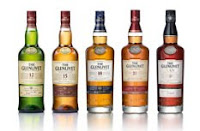 The Glenlivet, which is one of the most iconic single malts and second best selling in the world (behind Glenfiddich), have announced new packaging for their range of whiskies. The 12 years old remains unchanged in its green bottle, while the 15 years old will be sold in clear (rather than the previous green) glass for the first time, so as to show the rich golden colour. Both will be presented in a new luxury carton. The 18 years old (the most highly awarded whisky in the range) and the limited edition Nadurra series will move to the premium bottle shape used for the 21 years old and 25 years old expressions. This shape includes a heavier base, broader shoulders and a shorter neck. The 18 years old will also get a permanent gift box rather than the current cardboard carton. In addition to the different packaging, the embossed stamp of the distillery's founding family (George & J. G. Smith) plus the foundation date of 1824 have been given more prominence on all bottlings.
The Glenlivet, which is one of the most iconic single malts and second best selling in the world (behind Glenfiddich), have announced new packaging for their range of whiskies. The 12 years old remains unchanged in its green bottle, while the 15 years old will be sold in clear (rather than the previous green) glass for the first time, so as to show the rich golden colour. Both will be presented in a new luxury carton. The 18 years old (the most highly awarded whisky in the range) and the limited edition Nadurra series will move to the premium bottle shape used for the 21 years old and 25 years old expressions. This shape includes a heavier base, broader shoulders and a shorter neck. The 18 years old will also get a permanent gift box rather than the current cardboard carton. In addition to the different packaging, the embossed stamp of the distillery's founding family (George & J. G. Smith) plus the foundation date of 1824 have been given more prominence on all bottlings.Glenmorangie > new luxury Pride 1981 announced
 The famous distillery from the north Highlands has announced a limited edition whisky addition to its luxury/premium range. The Pride 1981 is presented in an extraordinary piece of packaging (pictured, left), comprising of a bespoke wood and metallic box and a Baccarat crystal decanter. The whisky was distilled in 1981 and has undergone maturation for its first 18 years in first fill ex-bourbon casks, before being transferred to premium Chateau d'Yquem Sauternes dessert wine casks for a further 10 years. It has been bottled at an alcoholic strength of 56.7% ABV and only 1000 bottles will be released worldwide on 1 July. Each bottle will cost £2500.
The famous distillery from the north Highlands has announced a limited edition whisky addition to its luxury/premium range. The Pride 1981 is presented in an extraordinary piece of packaging (pictured, left), comprising of a bespoke wood and metallic box and a Baccarat crystal decanter. The whisky was distilled in 1981 and has undergone maturation for its first 18 years in first fill ex-bourbon casks, before being transferred to premium Chateau d'Yquem Sauternes dessert wine casks for a further 10 years. It has been bottled at an alcoholic strength of 56.7% ABV and only 1000 bottles will be released worldwide on 1 July. Each bottle will cost £2500.Master of Malt > launch world's oldest whisky liqueur
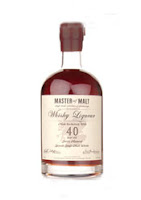 The award winning and innovative online whisky retailer and independent bottler Master of Malt have released the world's oldest whisky liqueur. The liqueur is made using 40 year old single malt from an undisclosed Speyside distillery, along with other ingredients such as cinnamon bark, cloves and orange peel to compliment the flavours of the whisky. The liqueur is available from the Master of Malt website at the price of £219.95 for a 70cl bottle. It has been bottled at 43% ABV. The 40 year old liqueur joins a range of new liqueurs that includes ages of 10,15, 21 and 30 years of age which are £26.95, £39.95, £59.95 and £109.95 for a 70cl bottle respectively. Alternatively, you can order a 3cl sample of each one in a five piece set for £29.95.
The award winning and innovative online whisky retailer and independent bottler Master of Malt have released the world's oldest whisky liqueur. The liqueur is made using 40 year old single malt from an undisclosed Speyside distillery, along with other ingredients such as cinnamon bark, cloves and orange peel to compliment the flavours of the whisky. The liqueur is available from the Master of Malt website at the price of £219.95 for a 70cl bottle. It has been bottled at 43% ABV. The 40 year old liqueur joins a range of new liqueurs that includes ages of 10,15, 21 and 30 years of age which are £26.95, £39.95, £59.95 and £109.95 for a 70cl bottle respectively. Alternatively, you can order a 3cl sample of each one in a five piece set for £29.95.
labels:
glenlivet,
glenmorangie,
inbox,
master of malt,
whisky liqueurs,
whisky news
Thursday, December 17, 2009
Have just tried ... Whisky liqueurs (Part 2)
 The Christmas festive period is a time when the sales of whisky liqueurs goes through the roof, so we have decided to review a few of them in the lead up to the Big Day. In this second part of our review, we are concentrating on the cream based whisky liqueurs. The first post - Have just tried ... Whisky liqueurs (Part 1) - has proved very popular and featured some of the non creamy whisky liqueurs available in the UK market. It also contains further general information and facts about whisky liqueurs, so please click on the link above to read it.
The Christmas festive period is a time when the sales of whisky liqueurs goes through the roof, so we have decided to review a few of them in the lead up to the Big Day. In this second part of our review, we are concentrating on the cream based whisky liqueurs. The first post - Have just tried ... Whisky liqueurs (Part 1) - has proved very popular and featured some of the non creamy whisky liqueurs available in the UK market. It also contains further general information and facts about whisky liqueurs, so please click on the link above to read it.Cream based whisky liqueurs contain two obvious ingredients - whisky and cream! Other than this they can be sweetened with sugar or syrup and flavoured with almost anything, with the most common things being fruit, nuts, honey, spices and herbs. They generally have a lower alcoholic strength (this is called the ABV - alcohol by volume) than the non cream liqueurs and are usually have a strength of 15-20% ABV. Most are recommended to be served chilled or with ice, although they can also be used in desserts and other sweet recipes. We are trying all of these samples chilled from the fridge.
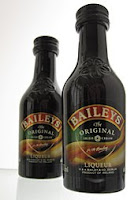 NEW - Bailey's Coffee
NEW - Bailey's CoffeeThis product has just been launched for Christmas 2009 and we have just received our sample from Diageo, who currently own and market the brand. Bailey's is the most well known cream based whisky liqueur and is made with Irish whisky, caramel and cream. The regular Bailey's is the biggest selling liqueur of either type in the world and they also release other bottlings in the range that are flavoured with mint, chocolate and orange. All are bottled at 17% ABV. The Original was released in 1974 and was the first whisky liqueur to be made with cream.
The colour of this new Bailey's Coffee is like that of a milky coffee/hot chocolate and the nose is reminiscent of instant coffee and hard boiled coffee caramel sweets. On the palate, this is very viscous and has the feeling of condensed milk. It has butter, toffee, coffee (instant coffee again) notes and a touch of alcohol burn in the background. The finish is short and sweet but leaves your mouth covered in thick buttery liquid. Ice would definitely help to stop this being so cloying but the flavours are pleasant and enjoyable. A 70cl bottle should cost £10-12.
 Columba Cream
Columba CreamThis liqueur is a mixture of single malt whisky, honey and cream. It is named after St. Columba who arrived on the western Scottish isle of Iona in 563 AD. The link is that the single malt included is made at Tobermory, a distillery on the neighbouring island of Mull. It is bottled at 17% ABV and is available in 70cl, 35cl and 5cl bottles (a 70cl bottle should cost £15-18). The colour of Columba is reminiscent of latte coffee and the nose smells incredibly sweet with lots of sugary honey coming through. On the palate, this is rich, creamy and extremely sweet - there is a lot of caramel, honey and toffee-like notes present and it sticks to your mouth and it is hard to shift! No whisky is detectable. The finish is short, very sweet and cloying. Keep a glass of water handy, your palate may need it!
 Drumgray
DrumgrayOr to give it its full name Mrs. Walker's Drumgray Highland Cream. This liqueur follows an original recipe that a Mrs. Walker used to follow on her central Highland farm. It is made using single malt whisky from the Deanston distillery and cream. Drumgray is sold in 70cl, 35cl and 5cl bottles (a 70cl bottle should cost £10-12) and has an alcoholic strength of 17% ABV. The liqueur has the colour of a Cappuccino coffee and the nose has some malted barley, toffee and caramel notes. It gives the impression of being rich and sweet. This is backed up on the palate - it is rich, almost sticky and coats the inside of your mouth. There is again toffee, caramel and cereals but the silky, velvety nature is tainted by some harsh alcoholic burn. The finish is long and sweet with the alcohol burn particularly prominent.
 Heather Cream
Heather CreamThis liqueur was first produced in 1980 and is a marriage of Balblair single malt whisky and fresh cream (it is one of the few to be made with fresh cream). It is marketed as the 'Cream of Scotland' and is released in 70cl, 35cl and 5cl bottles at 17% ABV (a 70cl bottle should cost £12-15). Heather Cream has a very pale colour (think of very milky tea) and the nose is subtle and delicate. There is some sweetness (imagine toffee) and cream with some maltiness from the whisky coming through. On the palate, this is fresh, clean and not as cloying as some of its competitors. It feels silky and light with some lovely caramel, toffee, cereal and vanilla notes present. The finish is pleasantly long with the caramel note coming through well.
 Merlyn
MerlynThis is a cream based whisky liqueur made by Penderyn, the only Welsh single malt whisky distillery. It is named after the famous Welsh wizard who features in the Legend of King Arthur tales. The liqueur is only made in small batches and is only sold in 70cl and 5cl bottles (a 70cl bottle should cost around £15-18). The colour is very light and milky and the nose is light and subtle but with some interesting elements - caramel, honey, malty cereal grains and a touch of grassiness (imagine dried grass). This is delicate on the palate with the fresh cream, honey and whisky combining well. The finish is short and refreshing - the honey is predominant but the cereals and grassiness of Penderyn's whisky comes through. Definitely our favourite!
Friday, December 11, 2009
Have just tried ... Whisky liqueurs (Part 1)
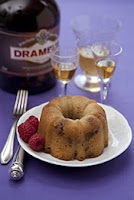 Christmas is here and it is the time of the year when whisky sales go through the roof. Another area of the market that is extremely popular and records high sales during the festive period is that of whisky liqueurs. These liqueurs attract a new and different set of drinkers to the world of whisky and are consumed in a different way to single malt or blended whiskies. They are commonly sweet and can be served as a dessert (on their own or incorporated with something else), with coffee or cream, in a cocktail or over ice.
Christmas is here and it is the time of the year when whisky sales go through the roof. Another area of the market that is extremely popular and records high sales during the festive period is that of whisky liqueurs. These liqueurs attract a new and different set of drinkers to the world of whisky and are consumed in a different way to single malt or blended whiskies. They are commonly sweet and can be served as a dessert (on their own or incorporated with something else), with coffee or cream, in a cocktail or over ice.The origin of the word liqueur is allegedly derived from the Latin word liquifacere, which is a verb and translates as ‘to become liquid’. Others say that it is derived from the French word liquor. The term ‘liqueur’ relates to an alcoholic drink that has been sweetened with sugar and then flavoured with something. This flavouring can be almost anything and the most common are fruit, nuts, honey, spices, herbs or cream. In the case of whisky liqueurs, whisky is the main ingredient that has then had sugar and other ingredients added. The ingredients are usually infused or macerated together and left for a short period in order for the flavours to marry together. Most whisky liqueurs have an alcoholic strength (called the ABV) of between 15-35%.
Whisky liqueurs are made around the globe and most fall in to two categories - cream liqueurs or non-cream liqueurs. A famous example of a cream liqueur is Bailey's, an Irish whisky liqueur that is the biggest selling whisky liqueur in the world. Two well known non-cream liqueurs are Drambuie and Glayva. A number of Scottish distilleries release their own versions of whisky liqueurs and the well known ones include Macallan Amber, Glenfiddich Malt Liqueur, Arran Gold and Edradour Cream. American whiskies are also used in liqueurs with the most well known being Southern Comfort and Wild Turkey American Honey. There are many products available and we have sampled a few of whisky liqueurs on the market. We have split our reviews in to two parts, beginning here with some non-cream whisky liqueurs.
 Bruadar
Bruadar Bruadar is a whisky liqueur that is made from single malt whisky, honey and sloe berries. Bruadar means 'dream' in Gaelic. This liqueur is sold in 70cl, 35cl and 5cl bottles with a 70cl bottle costing £15-20. It has an alcoholic strength of 22% ABV and was formerly known as Scottish Highland liqueur. The colour of Bruadar is light and straw-like with a fresh nose that contains obvious honey and the fruity, bittersweet sloe berries (if you have ever tried sloe gin, then it has the same dark fruity aroma). On the palate, this is again light, sweet and fruity (the sloe berries again) and some malty cereal notes and vanilla come through. The finish is short and sweet although the sloes and the whisky give an interesting bitter note right at the end.
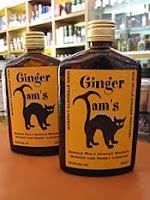 Ginger Tam's
Ginger Tam's This Ginger Tam's is a whisky liqueur with a kick! It is made from whisky, honey and ginger and is bottled at the high alcoholic strength of 48% ABV. This makes it much stronger than most other liqueurs and as a result is only sold in 35cl and 5cl bottles. The liqueur is a golden orange in colour and the nose is packed with prickly, fiery fresh ginger and sweet floral honey (think of heather honey). On the palate, this is powerful! The ginger is more like crystalised ginger now and there the associated lovely root-like earthiness. There is plenty of thick honey and vanilla, but not much whisky is detectable. The finish is fiery and the earthy ginger burns away for ages. This would make a great 'hot toddy' and would sort out a sore throat! It is powerful, cloying and sticks to the inside of your mouth. Not for the faint hearted.
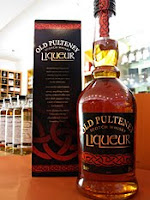 Old Pulteney Liqueur
Old Pulteney LiqueurThis liqueur is made with Old Pulteney single malt whisky, honey, spices and a combination of natural herbs. Old Pulteney is a distillery that is located in the north Highland town of Wick. It is the most northerly distillery on mainland Scotland. The liqueur is bottled at 28% ABV and is available in 70cl and 5cl bottles, with a 70cl bottle costing £15-20. The colour is dark golden orange and the nose has honey and a malty cereal note to it. There is also a touch of herbal grassiness (think of dried grasses or hay) and a strange aroma that reminded us of washing up liquid. On the palate, this liqueur is thin and slightly prickly. There is some lovely sweet honey, dried fruits (imagine sultanas), vanilla, and candied orange peel that combine well with the more bitter grassy element. The shortish finish is sweet, syrupy and full of honey.
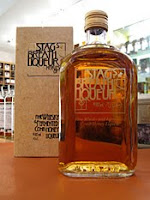 Stag's Breath
Stag's BreathThis liqueur is made from single malt Highland whisky and fermented honeycomb. It has been produced by Miekle's of Scotland since 1989 and is one of the most popular whisky liqueurs in the UK. The liqueur is bottled at 19.8% ABV and is sold in 70cl, 35cl, 10cl and 5cl bottles. A 70cl bottle should cost £15-20, depending on where you find it. The colour is golden and the nose is sweet and honeyed - you can detect the waxiness of the honeycomb. On the palate, this is surprisingly light and refreshing. It is sweet and fresh with lots of soft honey. Nothing else is detectable (including any whisky) and it feels like a liquified cold and flu lozenge. The finish is short, refreshing and quite sharp with the influence of the whisky being minimal. Basically, this is good but tastes like alcoholic honey!
The Drambuie image at the beginning of this post is taken from The Great Spirits Baking Company, whose website we have recently discovered and contains many products and ideas for recipes that use liqueurs and other spirits.
Subscribe to:
Posts (Atom)



